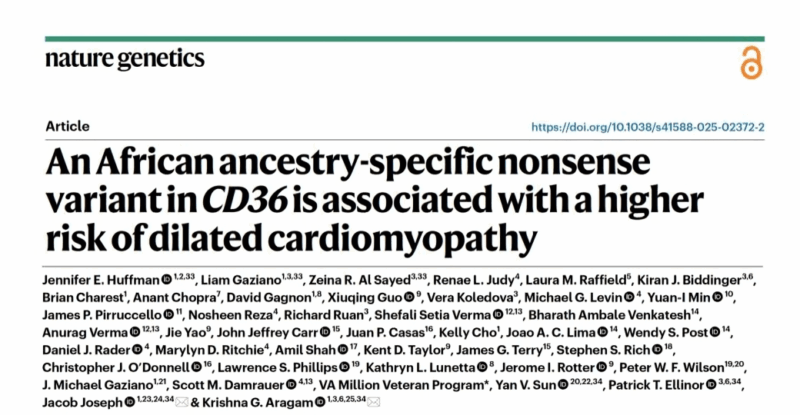
Krishna Aragam: An African Ancestry–Specific CD36 Variant Raises DCM Risk
Krishna Aragam, Director of Cardiovascular Genomics at Cleveland Clinic, posted on LinkedIn:
”Why are dilated cardiomyopathy (DCM) and heart failure about twice as common in individuals of self-identified Black race?
This risk difference has long been recognized but not fully explained by traditional risk factors or social determinants.
Our new paper in Nature Genetics identifies a key contributor: ”A common loss-of-function variant in the gene CD36, specific to individuals of African ancestry, that increases risk of DCM.”
In the VA Million Veteran Program, we found that:
• 1 in 6 of African ancestry carries one copy → ~33% higher DCM risk
• 1 in 100 of African ancestry carries two copies → ~3× higher risk
• Variant is virtually absent in other populations
This single CD36 variant explains 8% of DCM in African ancestry populations — a greater impact on DCM than diabetes or chronic kidney disease — and accounts for 20% of the excess DCM risk compared with European ancestry individuals.
Mechanistically, CD36 encodes the transporter responsible for moving long-chain fatty acids (the heart’s main fuel) into cardiomyocytes. We found that loss of CD36 impairs fuel uptake, mitochondrial energy production, and contractility — revealing a myocardial energetic pathway to heart failure.
The variant’s higher frequency likely reflects positive selection in sub-Saharan Africa, where CD36 deficiency may have conferred protection against severe malaria.
This represents a new paradigm linking ancestry, metabolism, and heart failure.
Grateful to an extraordinary team across institutions, especially Jennifer Huffman, Liam Gaziano, and Zeina Al Sayed for leading this work, and Patrick Ellinor, Jacob Joseph, and Yan Sun for key support.
And most importantly, to all Veterans in the U.S. Department of Veterans Affairs Million Veteran Program, without whom this discovery would not have been possible.
Looking forward to extending this work across Cleveland Clinic, Mass General Brigham, the Broad Institute of MIT and Harvard, and other collaborating institutions to better understand the biology, refine early risk prediction, and explore how insights into myocardial energetics may guide new strategies for heart failure prevention and therapy.”
Read the full article here.
Article: An African ancestry-specific nonsense variant in CD36 is associated with a higher risk of dilated cardiomyopathy
Authors: Jennifer E. Huffman, Liam Gaziano, Zeina R. Al Sayed, Renae L. Judy, Laura M. Raffield, Kiran J. Biddinger, Brian Charest, Anant Chopra, David Gagnon, Xiuqing Guo, Vera Koledova, Michael G. Levin, Yuan-I Min, James P. Pirruccello, Nosheen Reza, Richard Ruan, Shefali Setia Verma, Bharath Ambale Venkatesh, Anurag Verma, Jie Yao, John Jeffrey Carr, Juan P. Casas, Kelly Cho, Joao A. C. Lima, Wendy S. Post, Daniel J. Rader, Marylyn D. Ritchie, Amil Shah, Kent D. Taylor, James G. Terry, Stephen S. Rich, Christopher J. O’Donnell, Lawrence S. Phillips, Kathryn L. Lunetta, Jerome I. Rotter, Peter W. F. Wilson, J. Michael Gaziano, Scott M. Damrauer, VA Million Veteran Program, Yan V. Sun, Patrick T. Ellinor, Jacob Joseph, Krishna G. Aragam

Stay updated on all scientific advances with Hemostasis Today.
-
Feb 23, 2026, 18:13Fight4Hematology Supports Research and Empowers the Next Generation – ASH
-
Feb 23, 2026, 17:59Wolfgang Miesbach: Real-World Evidence of Emicizumab on Joint Outcomes in Hemophilia A
-
Feb 23, 2026, 17:56Shiny K Kajal: The Transfusion Reaction We Often Miss
-
Feb 23, 2026, 17:53Radheshyam Meher: Contributing to the Transfusion Evidence Round-Up for International Childhood Cancer Day 2026
-
Feb 23, 2026, 17:46Mahesan Subramaniam: The Physiological Impact of Anger on Immunity
-
Feb 23, 2026, 17:42Bryan Fry: First Evidence That Bothrops atrox Venom Directly Activates Human Factor VII
-
Feb 23, 2026, 17:34Bastu Odoka: Why Blood Should NOT be Left at the Bedside to ‘Warm’
-
Feb 23, 2026, 17:28Henry Burkitt: Patients Are Challenging How the Medicines Policy System Works in England
-
Feb 23, 2026, 16:50Mutaz Al‑Sabah: Interesting Webinar on FH in Women is Now Available to Watch

